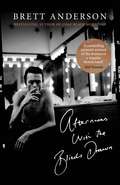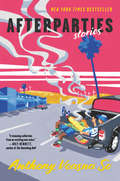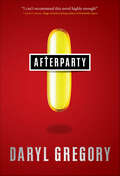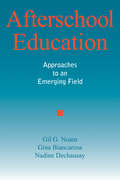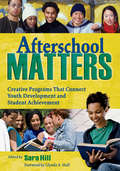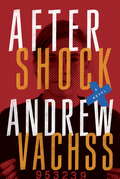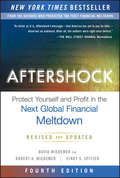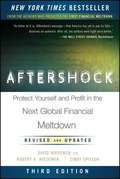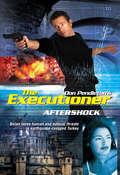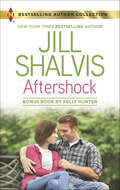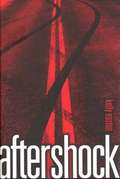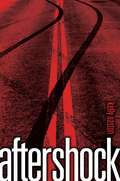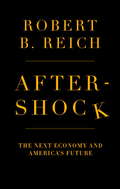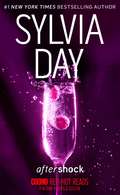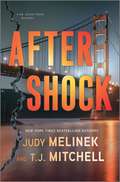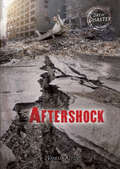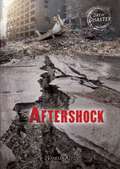- Table View
- List View
Afternoons with the Blinds Drawn
by Brett Anderson'A compelling personal account of the dramas of a singular British band' Neil TennantThe trajectory of Suede - hailed in infancy as both 'The Best New Band in Britain' and 'effete southern wankers' - is recalled with moving candour by its frontman Brett Anderson, whose vivid memoir swings seamlessly between the tender, witty, turbulent, euphoric and bittersweet. Suede began by treading the familiar jobbing route of London's emerging new 1990s indie bands - gigs at ULU, the Camden Powerhaus and the Old Trout in Windsor - and the dispiriting experience of playing a set to an audience of one. But in these halcyon days, their potential was undeniable. Anderson's creative partnership with guitarist Bernard Butler exposed a unique and brilliant hybrid of lyric and sound; together they were a luminescent team - burning brightly and creating some of the era's most revered songs and albums.In Afternoons with the Blinds drawn, Anderson unflinchingly explores his relationship with addiction, heartfelt in the regret that early musical bonds were severed, and clear-eyed on his youthful persona. 'As a young man . . . I oscillated between morbid self-reflection and vainglorious narcissism' he writes. His honesty, sharply self-aware and articulate, makes this a compelling autobiography, and a brilliant insight into one of the most significant bands of the last quarter century.
Afternoons with the Blinds Drawn
by Brett Anderson'A compelling personal account of the dramas of a singular British band' Neil TennantThe trajectory of Suede - hailed in infancy as both 'The Best New Band in Britain' and 'effete southern wankers' - is recalled with moving candour by its frontman Brett Anderson, whose vivid memoir swings seamlessly between the tender, witty, turbulent, euphoric and bittersweet. Suede began by treading the familiar jobbing route of London's emerging new 1990s indie bands - gigs at ULU, the Powerhaus and the Old Trout in Windsor - and the dispiriting experience of playing a set to an audience of one. But in these halcyon days, their potential was undeniable. Anderson's creative partnership with guitarist Bernard Butler exposed a unique and brilliant hybrid of lyric and sound; together they were a luminescent team - burning brightly and creating some of the era's most revered songs and albums.In Afternoons with the Blinds drawn, Anderson unflinchingly explores his relationship with addiction, heartfelt in the regret that early musical bonds were severed, and clear-eyed on his youthful persona. 'As a young man . . . I oscillated between morbid self-reflection and vainglorious narcissism' he writes. His honesty, sharply self-aware and articulate, makes this a compelling autobiography, and a brilliant insight into one of the most significant bands of the last quarter century.
Afterparties: Stories
by Anthony Veasna SoA vibrant story collection about Cambodian-American life—immersive and comic, yet unsparing—that offers profound insight into the intimacy of queer and immigrant communities. <p><p> Seamlessly transitioning between the absurd and the tenderhearted, balancing acerbic humor with sharp emotional depth, Afterparties offers an expansive portrait of the lives of Cambodian-Americans. As the children of refugees carve out radical new paths for themselves in California, they shoulder the inherited weight of the Khmer Rouge genocide and grapple with the complexities of race, sexuality, friendship, and family. <p><p> A high school badminton coach and failing grocery store owner tries to relive his glory days by beating a rising star teenage player. Two drunken brothers attend a wedding afterparty and hatch a plan to expose their shady uncle’s snubbing of the bride and groom. A queer love affair sparks between an older tech entrepreneur trying to launch a “safe space” app and a disillusioned young teacher obsessed with Moby-Dick. And in the sweeping final story, a nine-year-old child learns that his mother survived a racist school shooter. <P><P><b>A New York Times Bestseller</b>
Afterparty
by Ann Redisch StamplerA toxic friendship takes a dangerous turn that leads to a rooftop tragedy in this riveting novel from the author of Where It Began.Emma is tired of being good. She's always done what's expected of her, and she's starting to feel antsy. That's why meeting Siobhan is the best thing to happen to her, before it's the worst. Because Siobhan is dangerous, and fun, and alluring, and experienced... In other words, she's everything Emma isn't. And then things go terribly wrong. There's Dylan, the boy who comes between them. And it's true that their high-stakes pacts are spinning out of control. But there's even more to the story--and everything comes to a head at an infamous afterparty where debauchery rages on the rooftop, and an intense, long-awaited confrontation results in a fatal freefall...
Afterparty
by Ann Redisch StamplerA toxic friendship takes a dangerous turn in this riveting novel from the author of Where It Began.Emma is tired of being good. Always the perfect daughter to an overprotective father, she moves to Los Angeles dying to reinvent herself. This is why meeting Siobhan is the best thing that ever happened to her. And the most dangerous. Because Siobhan is fun and alluring and experienced and lives on the edge--and she wants Emma to come with her. And it may be more than Emma can handle. Their high-stakes pacts are spinning out of control. Loyalties and boundaries are blurred. And it all comes to a head at the infamous Afterparty, where an intense, inescapable confrontation ends in a plummet from the rooftop... How many lies can you tell your father, your best friend, your boyfriend, and yourself before everything falls apart?
Afterparty
by Daryl GregoryA scientist goes on a mind-bending, violent chase across North America to save civilization from her creation in this science fiction thriller.It begins in Toronto, in the years after the smart drug revolution. Any high school student with a chemjet printer and internet connection can download recipes and print drugs, or invent them. A seventeen-year-old street girl finds God through a new brain-altering drug called Numinous, used as a sacrament by a new Church that preys on the underclass. But she is arrested and put into detention, and without the drug, commits suicide.Lyda Rose, another patient in that detention facility, has a dark secret: she was one of the original scientists who developed the drug. With the help of an ex-government agent and an imaginary, drug-induced doctor, Lyda sets out to find the other three survivors of the five who made the Numinous in a quest to set things right . . .Praise for Afterparty“I can’t recommend this novel highly enough!” —Nancy Kress, Hugo Award–winning author of Probability Space“This taut, brisk, gripping narrative, dazzlingly intercut with flashbacks and sidebars, oozes warmth and wit. A hugely entertaining, surprising and perhaps prophetic package that, without seeming to, raises profound questions about the human mind and the nature of perception.” —Kirkus Reviews (starred review)
Afterschool Education: Approaches to an Emerging Field
by Gil G. Noam Gina Biancarosa Nadine DechausayThe authors survey the current afterschool landscape and bring to light important issues and practices within the field, explore the challenges and opportunities facing afterschool education programs, and point to future directions for these burgeoning educational ventures. Afterschool education has grown in recent years into a vast and diverse enterprise. In the United States, young people spend almost a third of their organized time (including school hours) in afterschool and summer programs. Yet there is little clear and conclusive research on afterschool programs—research that would help guide the practice of existing afterschool programs and establish guidelines for the creation of new programs. An indispensable guide for practitioners, administrators, policy makers, and parents, Afterschool Education will serve as the cornerstone for all future accounts of and proposals for this crucial educational field.
Afterschool Education: Approaches to an Emerging Field
by Gil G. Noam Gina Biancarosa Nadine DechausayThe authors survey the current afterschool landscape and bring to light important issues and practices within the field, explore the challenges and opportunities facing afterschool education programs, and point to future directions for these burgeoning educational ventures. Afterschool education has grown in recent years into a vast and diverse enterprise. In the United States, young people spend almost a third of their organized time (including school hours) in afterschool and summer programs. Yet there is little clear and conclusive research on afterschool programs—research that would help guide the practice of existing afterschool programs and establish guidelines for the creation of new programs. An indispensable guide for practitioners, administrators, policy makers, and parents, Afterschool Education will serve as the cornerstone for all future accounts of and proposals for this crucial educational field.
Afterschool Matters: Creative Programs That Connect Youth Development and Student Achievement
by Sara L. HillThis book addresses the challenges of designing effective afterschool activities, provides quality program models from experts in the field, and aligns learning standards with youth development principles.
Aftershock
by Adrian HollowayDaniel was the sole survivor of a road accident that propelled three young people into the afterlife. Now he's back, and ready to convince his friends and family that Jesus is their only hope before they face judgement after death. Profoundly changed by his experience, he's nevertheless shocked to discover that other people can't share his certainty. In writing the story of Daniel and his friends, as they wrestle with the arguments for and against Christian belief, Adrian Holloway has given readers and youth leaders a unique weapon in their spiritual armoury. There really is nothing quite like this.
Aftershock
by Andrew VachssThe idyllic facade of a small coastal tourist magnet hides its secrets well. But when the shining star pitcher of the girls' softball team guns down the most popular boy in school, the shockwaves reverberate far beyond the school's walls. In the wake of the killing, two of the town's newer residents turn over deeply embedded rocks, exposing a subculture of almost unimaginable horror lurking beneath. Formerly a nurse with Médecins Sans Frontières, Dolly has become a defender and confidante to dozens of local teenage girls, and she refuses to accept that MaryLou ("Mighty Mary") McCoy's gunning down Cameron Taft in a high school hallway is a typical school shooting. Although MaryLou's guilt is not in doubt--it's even captured on the school's security camera--the girl insists on a trial . . . but inexplicably refuses to cooperate with her own defense. Enlisting her troupe of teenagers and the local contacts she has cemented, Dolly calls on all of her resources to get to the truth . . . and to whatever secret MaryLou is guarding. When Dolly's husband, Dell, sees his beloved wife begin her quest, he immediately signs on. A former mercenary and ex-Legionnaire, Dell treats this "job" as he would any other--with no boundaries. His entire arsenal is put into play: guile, extortion, tracking devices, shadow networks, and, finally, an act of terrorism that blows the cover off the soul-killing rite of passage demanded of the town's most vulnerable girls. Dell's discovery of MaryLou's true motive and the community's shocking failure to protect its children culminates in a decision to put the town itself on trial. The explosive verdict blows away the facade . . . and forces the village to stand in judgment of itself. The aftershocks keep coming until the foundation itself fractures, leaving cracks too deep to patch ever again.
Aftershock
by David Wiedemer Robert A. Wiedemer Cindy S. SpitzerSecure your financial future before the next big bubble bursts Aftershock provides a definitive look at the economic climate still ahead in 2015--and beyond--and details the steps you can take now to secure your financial future. Written by the authors who accurately predicted the financial crisis of 2008 and 2009, this book serves as both a warning and a game plan for investors looking to avoid catastrophic loss. This updated fourth edition has been expanded with new actionable insights about protection and profits in an increasingly confusing investment environment, and includes the latest data, updated charts and tables, and brand new coverage of monetary stimulus. With a look back at the domino fall of the conjoined real estate, stock, and private debt bubbles that triggered the last major crisis, this book paints a vivid picture of what to expect the next time the world's economy pops. You'll learn how to protect your assets before and during the coming fall, and how to capitalize on the opportunities everyone else is missing. The housing bubble has popped, toppling banks and sending shockwaves of stock market misery around the world. It may seem like the worst is over. It's not. This book shows you what's still to come, and how to ride the crest instead of being sucked under. Learn when, why, and how the global bubble will burst Understand the repercussions that will reach into your accounts Get up to date on the data, with expert analysis and insight Start protecting yourself now with a few smart investment moves The stock market, real estate, consumer spending, private debt, dollar, and government debt bubbles will burst, driving up unemployment, devaluing the dollar, and causing deep global recession. Aftershock helps you fortify your assets before the wave so you can enjoy clear skies after the storm.
Aftershock
by David Wiedemer Cindy Spitzer Robert A. WiedemerFrom the authors who accurately predicted the bursting of the global bubble economy comes the definitive look at what lies ahead in 2013 and beyond Written by the market oracles who predicted, with uncanny accuracy, the global financial meltdown and the economic chain reaction it set in motion, Aftershock offers a vivid picture of what to expect when the world's bubble economy inevitably pops. More importantly, it tells you how to protect your assets before and during the coming Aftershock and how to capitalize on the new opportunities that others will miss. Building on the valuable insights and proven predictions of their previous books, the authors of Aftershock, Third Edition offer their latest thinking and advice as the economy moves even closer to the coming aftershock. Explains why and how the stock market, real estate, consumer spending, private debt, dollar, and government debt bubbles will burst, driving up unemployment, devaluing the dollar, and causing deep recession around the globe Updated to include the latest developments, such as new coverage of monetary stimulus and a more global focus (with special attention to Europe and China)Offers new actionable insights about protection and profits in an increasingly confusing investment environment
Aftershock
by Sharon Sala Janis Reams Hudson Debra CowanPenance by New York Times bestselling author Sharon Sala: After being shot, Nicole Masters's penance for cheating death dictates that she must help others--even if it means putting herself in danger. Now she and Detective Dominic Tucci-- a neighbor determined to make Nicole accept her new gift-- team up to rescue an innocent child before time runs out. . . . After the Lightning by Janis Reams Hudson: Hailey Cameron fears she's fried more than a few brain cells after she's struck by lightning and begins hearing voices. Experience has made former police detective Aaron Trent more accepting of this newfound ability than Hailey is. Especially since her gift might help him stop an underground child-smuggling ring. But has fate brought them together for another reason as well? Seeing Red by Debra Cowan: A near-death experience has firefighter Cass Holister witnessing fires before they happen. But it's proving harder to deal with Ben Wyrick--a man she once walked away from who is now investigating the blazes--than it is to handle her new talent!
Aftershock
by Don PendletonSHOCK WAVEMack Bolan is in Turkey to recover millions in stolen medical and relief supplies earmarked for displaced refugees in the civil-war-torn region. Racing to reclaim the cache before a violent insurgent group sells everything on the black market, Bolan finds his mission compromised when a massive earthquake rocks the region.Hunting his prey through a city in chaos-a hellzone where lethal aftershocks rip randomly through the crumbling urban landscape- Bolan remains determined to stop opportunists from profiting from their savagery. But he's up against two renegade paramilitary armies fueled by bloodlust. The Executioner faces several enemies, but his will to fight remains honed to a single, satisfying cause: justice.
Aftershock
by Jill ShalvisDESPERATE TIMES... If it hadn't been for the earthquake, Amber Riggs would never have made love to a perfect stranger. And no doubt about it, fire inspector Dax McCall was perfect. Who else could have taught her the meaning of passion at a time like that? Still, when Amber ran into him a year later she wasn't sure how he'd react. To her...or their three-month-old baby. She hadn't meant to keep the news from Dax, but he'd been out of town, and she'd been sort of relieved. After all, how do you tell the perfect man he has a perfect baby girl with a woman he doesn't know from Eve? BONUS BOOK INCLUDED IN THIS VOLUME! Exposed: Misbehaving with the Magnate by USA TODAY bestselling author Kelly Hunter Seven years ago Gabrielle was the housekeeper's daughter, and Luc Duvalier, as the heir to a vast fortune, was forbidden. Now she's returned home determined to face Luc as an equal-in every way!
Aftershock
by Kelly EastonIn shock and unable to speak after being in a car accident in Oregon which has killed his parents, seventeen-year-old Adam journeys across the country to his home in Rhode Island.
Aftershock
by Kelly EastonTORMENT: EXTREME PAIN OR ANGUISH OF BODY OR MIND Seventeen-year-old Adam is tormented. His parents have just been killed in a car crash in Idaho, and he has survived. In a speechless state of shock, Adam begins walking home, back to Rhode Island. But he can't think in a straight line: The past and present blend and merge in his thoughts; the future's a blank; he's lost his voice and his money. Memories fling themselves at him like stones, some inflicting great pain. In Adam's harrowing journey he faces many challenges. He confronts situations that demand violence or compromise from him, forcing him to question what it means to be a man, even as he tries to find his voice in a world suddenly devoid of meaning. This gripping and haunting novel is the story of one young man's struggle to survive -- literally -- on the road, and to propel himself emotionally from despair to hope and freedom.
Aftershock
by Robert B. ReichA brilliant new reading of the economic crisis--and a plan for dealing with the challenge of its aftermath--by one of our most trenchant and informed experts.When the nation's economy foundered in 2008, blame was directed almost universally at Wall Street. But Robert B. Reich suggests a different reason for the meltdown, and for a perilous road ahead. He argues that the real problem is structural: it lies in the increasing concentration of income and wealth at the top, and in a middle class that has had to go deeply into debt to maintain a decent standard of living.Persuasively and straightforwardly, Reich reveals how precarious our situation still is. The last time in American history when wealth was so highly concentrated at the top--indeed, when the top 1 percent of the population was paid 23 percent of the nation's income--was in 1928, just before the Great Depression. Such a disparity leads to ever greater booms followed by ever deeper busts. Reich's thoughtful and detailed account of where we are headed over the next decades reveals the essential truth about our economy that is driving our politics and shaping our future. With keen insight, he shows us how the middle class lacks enough purchasing power to buy what the economy can produce and has adopted coping mechanisms that have a negative impact on their quality of life; how the rich use their increasing wealth to speculate; and how an angrier politics emerges as more Americans conclude that the game is rigged for the benefit of a few. Unless this trend is reversed, the Great Recession will only be repeated. Reich's assessment of what must be done to reverse course and ensure that prosperity is widely shared represents the path to a necessary and long-overdue transformation. Aftershock is a practical, humane, and much-needed blueprint for both restoring America's economy and rebuilding our society.From the Hardcover edition.
Aftershock
by Sylvia Day#1 New York Times Bestselling AuthorSylvia DayAmerica's premier author of provocative fiction delivers the dramatic finale to a series set within the inner circle of glamour, sex and privilege.When it came to playing games, my lover, Jax, was a master strategist. He pulled strings behind the closed doors of D.C.'s most powerful political players and somehow still found time to nearly sideline my career. What he didn't know was that when I didn't like the rules, I threw them out and made my own. I wasn't going to let Jax get away with it. I wasn't going to let him get away at all.I loved Jax enough that it was impossible to give up. Jax loved me enough that giving up was the only end he'd consider. He didn't think I could swim with the sharks. It was entirely my pleasure to show him that I'd already dived in....
Aftershock (A Dr. Jessie Teska Mystery)
by Judy Melinek T.J. MitchellWhen an earthquake strikes San Francisco, forensics expert Jessie Teska faces her biggest threat yet in this explosive new mystery from the New York Times bestselling duoThere’s a body crushed under a load of pipes on a San Francisco construction site, and medical examiner Dr. Jessie Teska is on call. So it’s her job to figure out who it is—and her headache when the autopsy reveals that the death is a homicide staged as an accident.Jessie is hot on the murderer’s trail, then an earthquake sends her and her whole city reeling. When the dust clears, her case has fallen apart and an innocent man is being framed. Jessie knows she’s the only one who can prove it, and she races to piece together the truth—before it gets buried and brings her down in the rubble.With Melinek and Mitchell’s trademark blend of propulsive prose, deft plotting and mordant humor, this rollicking new installment in the Jessie Teska Mystery series will shake you up and leave you rattled.
Aftershock (Day Of Disaster Ser.)
by Vanessa ActonRay, Sasha, Liam, and Harper have been friends since they were young. They've gotten through the worst together, but it seems like a recent argument might be just enough to break the ties of their friendship for good. That is, until the earthquake hits. Together they must navigate through the rubble to get to safety. But suddenly Harper is missing. With aftershocks happening every few minutes, it's going to take all three of them to save their lost friend. Personal drama doesn't seem so serious when every moment is a struggle to stay alive.
Aftershock (Day of Disaster)
by Vanessa ActonRay, Sasha, Liam, and Harper have been friends since they were young. They've gotten through the worst together, but it seems like a recent argument might be just enough to break the ties of their friendship for good. That is, until the earthquake hits. Together they must navigate through the rubble to get to safety. But suddenly Harper is missing. With aftershocks happening every few minutes, it's going to take all three of them to save their lost friend. Personal drama doesn't seem so serious when every moment is a struggle to stay alive.
Aftershock (H.I.V.E. #7)
by Mark Walden(Note: This is Book 7 in the H.I.V.E. series. Originally published in England, the book is written with British punctuation and spelling.) Scheming, extorting, menacing and general evilness are nothing new in the world of villainy - indeed it's expected. But there are codes of conduct. Until now. In an attempt to purge the Global League of Villainous Enterprises of its more destructive elements, Dr Nero has underestimated the cunning and resources of those who oppose him. Meanwhile, Otto and the rest of the Alpha stream have been sent to begin their most feared exercise: The Hunt, in the icy wastes of Siberia. But there is a traitor in their midst. The first strike against Nero will be a strike against the Alpha stream. Villain-kind is on the brink of CIVIL WAR.
